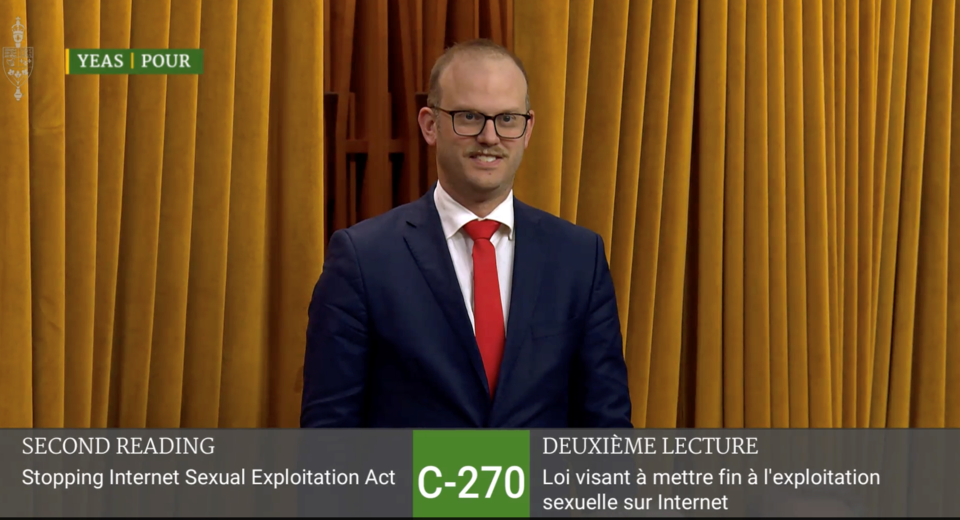OTTAWA — Canada is one step closer to ensuring that makers and distributors of explicit material online are held accountable to age and consent legislation after a bill from Peace River – Westlock MP Arnold Viersen received rare unanimous support at second reading.
On May 8, Viersen’s Stopping Internet Sexual Exploitation (SISE) Act, received 327 ‘yea’ votes from all sides of the House of Commons. The proposed legislation, also known as Bill C-270, will now move forward for review by the Justice Committee.
“I am grateful for the support from all members for this important legislation. It is rare for a Bill to have joint seconders from all five parties,” said Viersen.
The bill, intended to keep images of underage children and non-consenting adults out of commercial internet pornography, would require creators of materials to verify and keep records of the ages and informed consent of all individuals depicted if passed.
While laws prohibiting the use of non-consensual images and explicit images of children already exist, Bill C-270 would take the onus of proof from individuals and police and place it on creators and distributors.
“For years, pornographic platforms in Canada have published sexually explicit material without any requirement to verify the age or consent of those depicted in them,” said Viersen.
“As a result, horrific videos of sex trafficking, child exploitation, and sexual assault have proliferated on Canadian pornography websites. Many of these videos have been monetized, bringing in massive profits,” he added.
The SISE Act has been moving through the parliamentary process since Viersen introduced it in May 2022. The current version is the second iteration of the Act: the first was put forward one year prior, but died on the table as the federal election began.
Viersen’s bill, if given the go-ahead following the Justice Committee’s review, would allow creators and distributors found in violation of an indictable offence to be subject to a prison sentence of two years, up to $500,000 in fines, or both. Summary offences would be punishable by fines reaching $100,000.
Liberal MP for Etobicoke – Lakeshore, B.C. and Parliamentary Secretary to the Minister of Justice and Attorney General, James Maloney, spoke to the bill during the May 7 deliberations preceding the vote. While he did highlight the Liberal party’s “serious reservations” about aspects of SISE, he expressed support for the bill’s objective.
“I want to acknowledge that this conduct has caused those depicted in that material extreme suffering,” said Maloney. “I agree that we must do everything we can to protect those who have been subjected to this trauma and prevent it from occurring in the first place.”
SISE origins
“Imagine being the parent of a teenager daughter who has been missing for months and somebody discovers 50 explicit videos of that daughter being sexually abused on Pornhub, the most popular porn site in the world,” Viersen told the House of Commons during the April 9 session.
“How would someone feel if Pornhub’s only response was an auto-reply email? Understandably, one would be outraged. One would be furious, yet this happens over and over,” he added.
Viersen’s public advocacy for the issue began with a public letter written in conjunction with several other MPs to highlight the ongoing exploitation tied to Montreal-based online pornography conglomerate MindGeek, now known as Aylo.
The letter and a subsequent article published in the New York Times about the underage children featured on MindGeek sites sparked a House of Commons ethics committee review, which Viersen joined. It was during his time on this committee he heard testimony from young women impacted by unethical and illegal digital porn practices.
“No one should be publishing sexually explicit material without the express consent of everyone depicted in that material. Children cannot consent to exploitation. Victims of sex trafficking and sexual assault cannot consent.
“Those filmed without their knowledge cannot consent, yet pornography companies freely publish this content and profit from it,” added Viersen.
Following the review by the Justice Committee, the bill may move forward to the reporting stage, where MPs can propose amendments to the wording. If successful, it will be brought back to the House of Commons for a third reading and potentially forwarded to the Senate for review if passed.




